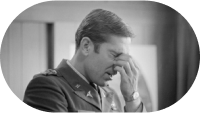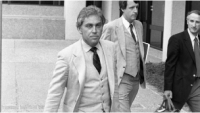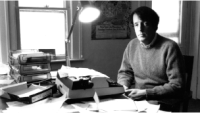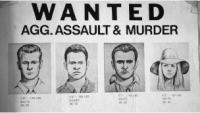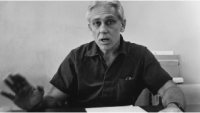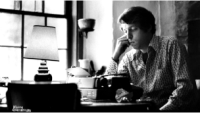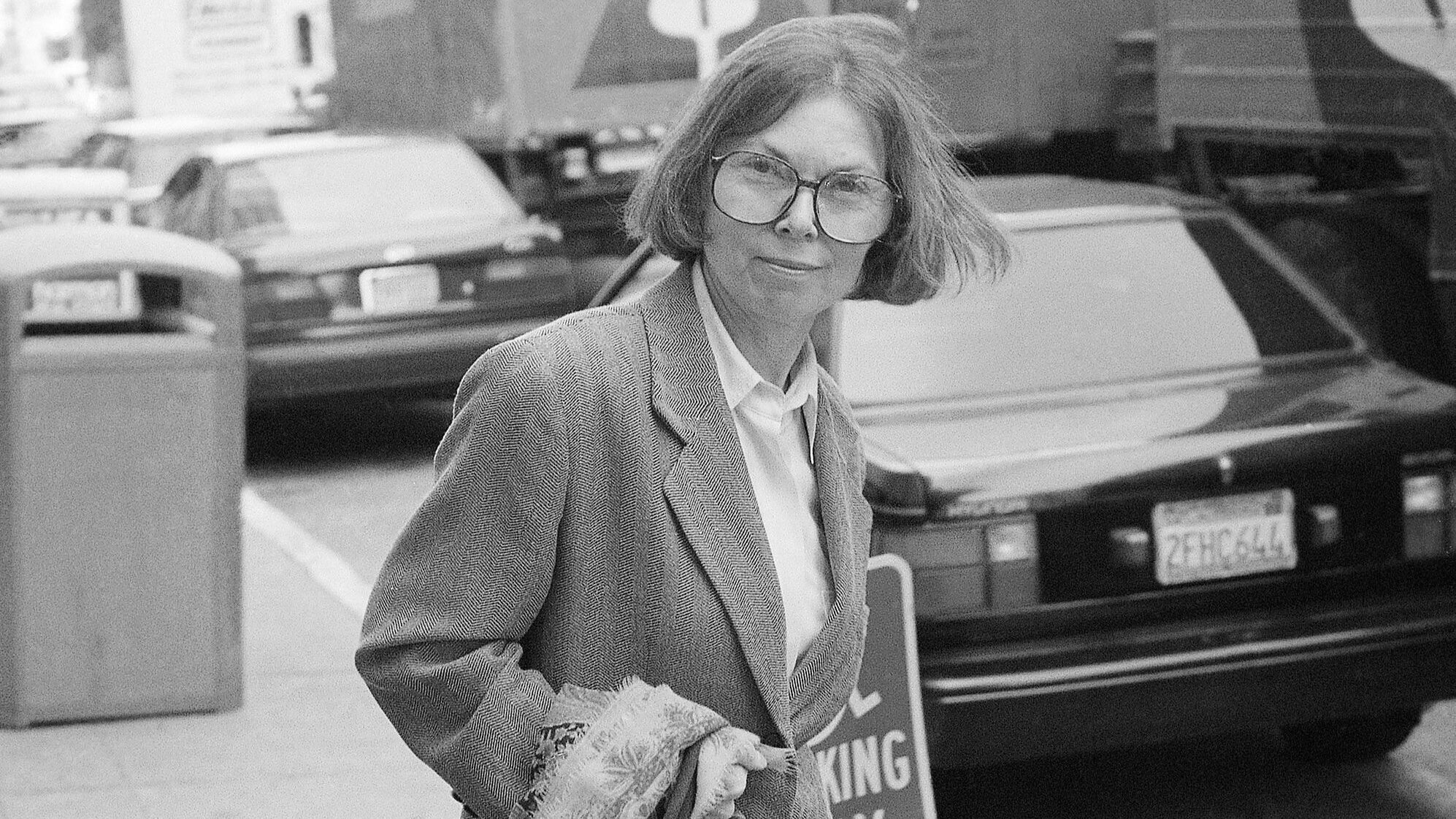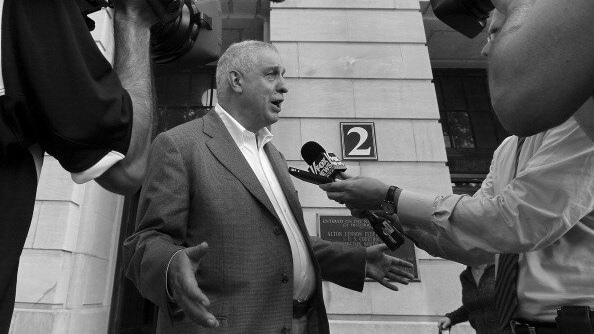Friends Become Enemies - Episode 5 | Morally Indefensible Podcast
EPISODE 5
MORALLY INDEFENSIBLE
CHAPTER 5 | FRIENDS BECOME ENEMIES
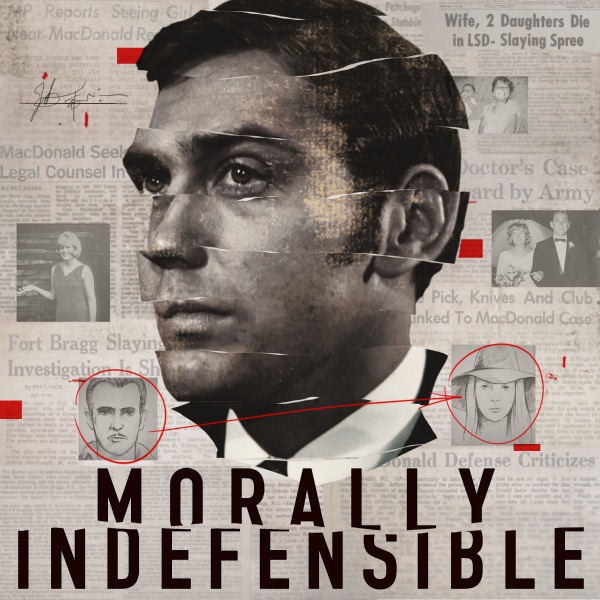

“There was a gleam in his eye, and I always knew that a gleam in Joe’s eye was a good sign that something big was going to happen.”NANCY DOHERTY, JOE MCGINNISS'S WIDOW.
ALL EPISODES
EPISODE TRANSCRIPT
CHAPTER 5: FRIENDS BECOME ENEMIES
Setup Ambi
Reporter : Thanks a lot for sitting through this tremendous heat...
By the Summer of 1983, Joe McGinniss's book, Fatal Vision, was about to hit bookstores across the country.
[MUSIC IN]
And now.. a camera crew is focusing on the book’s subject, Jeffrey MacDonald. He’s sitting in the visiting room of Bastrop Federal Correctional Institution in Texas.
News Guy: Alright, as you wish. Go right ahead.
Across from Jeff sits Mike Wallace, host of CBS’s widely watched 60 Minutes.
Wallace : MacDonald intends to file a motion for a new trial based on new evidence he says will corroborate his story that the murders were committed by the four intruders.
Jeff is here to talk about the new evidence that would prove his innocence. And Wallace was interested in Jeff’s account of the night of the murders.
Wallace : And so you got up and went to..?
Jeff: I tried to get off the couch and that’s where I was assaulted … apparently received some wounds including stab wounds and several blows to the head.
To Jeff, it must have seemed as if he’d finally caught a break.
[MUSIC OUT]
That is, until Wallace held up a copy of Fatal Vision, and the real reason for his visit became apparent.
MUSIC IN
Wallace : Joe McGinniss says the Jeff MacDonald he came to know is a consummate actor and that he plays his part so well that he can lie more persuasively than some other people can tell the truth. Even government prosecutors couldn’t come up with a motive or an explanation of how a man like MacDonald could have committed so brutal a crime. But Joe McGinniss thinks he’s found the key-- new evidence he discovered after the trial -- evidence he’s never discussed with MacDonald.
[MUSIC OUT]
[SFX TV OFF]
Keeler : Uh oh! And that’s how Jeffrey found out about it.
[Theme In]
William Buckley: Mr Joe McGinnis is the author of a best-selling book which is the inside story of how Nixon was really elected.
Frost : The book has caused a great deal of comment, Joe.
Buckley : It is the fruit of a great deception,
Frost : How you came to have all the access you did.
Buckley : One cannot suppose the competent people would have confided to Mr. McGinniss if they had known that he intended to write such a book as he has written.
Joe McGinniss: The only area in which dishonestly creeps in is if the reporter is to pretend to be completely objective.
Joe : I've never seen a book done from inside the defense in a major criminal trial.
Buckley : Most Americans do not care how a story was got, just so long as it was got.
Joe : The title search is finally over. The book will be called Fatal Vision.
I’m Marc Smerling and this is Morally Indefensible.
Chapter Five Friends become enemies...
[MUSIC OUT]
Keeler : There’s no Jeffrey MacDonald beats at most newspapers.
You know nobody had the Jeffrey MacDonald beat.
This is longtime journalist Bob Keeler. While he’s technically right, if any journalist ever had an unofficial Jeffrey MacDonald beat, it was Bob. Back in the seventies, Bob was writing his own book about the case...
Keeler : I had a little red box where I kept the manuscript. So, I was getting there little by little and then along comes Joe McGinniss who runs into Jeffrey in California and agrees to live with the defense during the trial. And Joe Mcginniss by that time had made a big name for himself covering, you know, The Selling of the President, the Nixon book…. Boom.
[MUSIC IN]
Bob Keeler: That was it. My opportunity to do a book was basically over at that point.
Keeler may have stopped writing his book… but he was still reporting on the case. He knew that Jeff and Joe had been close. So, after reading Fatal Vision, Keeler wanted to talk to Jeff.
Bob Keeler : I visited him at the Bastrop Federal Correctional Institute in Texas. So, this is a magazine piece I wrote. The headline is, “Convict and Writer. Two men, Three Murders, and a Book. I’m pretty sure just judging by the length of the quotes in the piece that I probably used a tape recorder for that interview.
He did and we’ve got those tapes.
[SFX tape recorder]
MacDonald : Joe’s a coward you know he hasn’t written a letter since Mike Wallace arrived. The day before Mike Wallace came here I got a letter from him normal, talking about the Yankees.
Keeler : It was the ultimate betrayal in his reckoning that Joe McGinniss had done this to him.
Keeler : Jeffrey now knew that the book he was expecting from Joe, i.e. Jeffrey the tortured innocent, was not the book that Joe was delivering.
Keeler : Obviously now you’re just fearful of how much it’s gonna hurt, I assume.
Jeff : Mmmhmm.
Keeler : I was trying to get from him what his reaction to Joe’s book was.
Jeffrey MacDonald: I can’t give you a complete opinion because I haven’t read the book yet.
Bob Keeler: Right.
Jeffrey MacDonald: Because I entrusted my life to him and apparently it’s been pretty well violated.
Keeler : He should have figured this out! If you’re playing football and he was a football player, you studied the team you’re about to play. You make some judgments about what they’re gonna do to you.
Keeler : Why didn’t you read the previous books before?
Jeff : Because I thought my perception of Joe was accurate.
Keeler : You know the Selling of the President, the Nixon book, was another example of his modus operandi. He didn’t understand that Joe McGinniss had this MO of worming his way into the confidence of somebody and then turning around and screwing him.
Jeffrey MacDonald: We still had this...I guess hope more than anything that we hadn’t been incorrect on Joe and that he did have integrity and that he was gonna write a good book. He had never -
Bob Keeler : That was at that point, I mean aside from getting a new trial that became your only hope of some kind of vindication.
Jeffrey MacDonald: Exactly.
MUSIC OUT
Something that had perplexed Keeler while reading Fatal Vision was how many of the book’s most damning revelations seemed to come from Jeffrey MacDonald himself. They were often in quotes. It turns out, these were pulled directly from the tapes Jeff had sent to Joe from prison.
Bob Keeler : Okay so you would just sort of sit there and -
Jeffrey MacDonald: Well, making the tapes, they were very hard to do. Sometimes I would put them off for weeks on end until he was really harassing me to get them. I would sit down for a long evening and make a couple hours worth of tapes. I found it emotionally very trying. Then I made what in retrospect may have been the wrong decision.
MUSIC IN
For Jeff, the wrong decision was trusting Joe... and opening up in the tapes he sent him. Getting Jeff to get personal in the tapes had required a lot of coaxing --
Joe Letter Reverb : “Don’t be bashful, I’m the only one who hears these tapes…”
Joe letter Rverb : “Hang as loose as you can…”
Joe Letter Reverb: “You’re talking to me and only me….”
Well, that turned out not to be true.
BREAK 1
ACT TWO
Bob : Basically this book would not have been possible without your serving yourself up to him. There’s an awful lot of sections that just say the voice of Jeffrey MacDonald that’s a verbatim transcript of your tape sprinkled throughout the book you know.
Sitting across a metal table from Jeff, in a small cement block room at Bastrop, Keeler pulls out his own, well-thumbed-through copy of Fatal Vision.
[MUSIC IN]
Bob Keeler : Well one thing is that in the tapes.
Jeff Tape Recre : Testing, testing, testing-- this is Jeff to Joe.
Bob : The tapes say an awful lot about your sex life, about women you dated and women you slept with.
Jeff Tape Recre : Tape 2, Side 1 for Joe.
Bob: I mean the cumulative effect of this over the period of the whole book is...
Jeff: ...Sleazy.
Bob : Yeah.
These are recreated excerpts of those tapes that Jeff sent to Joe.
Jeff Recre : I did tend to sleep around, there’s no question, I’ve never denied that and I’m not denying that now. I know this sounds like a defendant talking. It never meant anything to me. Women were always easy for me.
Jeff : I had a million opportunities in medical school, believe me. Every nurse was reasonably available to medical students.
Gloria was a good looking tall brunette. She was just available. She made the first move.
I did tend when I was Texas to find an airline stewardess, take her to a party, and bed her that night.
Took her for a drink, she said let’s go back to your room, so we went back and I balled her.
She was really a screwed up bitch, there’s no denying that. Fun person when she had her head on straight, which was infrequently.
Keeler There are like three or four women’s names mentioned in the period of a couple pages in the book, this one is shuttling in and that one is shuttling out. And it just the cumulative effect is to make it, you know, it’s like sort of a sleazy overall effect.
I found being the hunter to be more exciting than to be pursued, but I never turned down a good looking woman who made a pass at me.
MUSIC OUT
Fatal Vision also revealed that after Jeff was charged with the murders of his family and while he was confined to his barracks by the army, he was having sex with a woman in his quarters.
Jeff : Are those things in the book?
Bob : Those things are in the book.
Jeff : What does that have to do with whether or not I commited a triple homicide?
Bob : You would argue that… okay...
Jeff: It’s not relevant, it’s not relevant.
But it was relevant. Jeffrey MacDonald and his supporters had always argued that Jeff couldn’t have committed the murders because he was a loving husband and father. The revelations, in Jeff’s own words, revealed him to be a serial cheater, with little regard for his wife. But even more perplexing to Keeler was why would Jeff tell a writer about any of this...
Bob Keeler : But the question I have is why talk that frankly about -
Jeffrey MacDonald: I didn’t want Joe spending two years thinking gee MacDonald isn’t telling me the whole story. Okay so I told him the whole story from my viewpoint assuming he would then edit.
Keeler : Yeah.
MACDONALD : I didn’t expect him to put quotes around my words. That’s cheap, that's cheap paperback stuff. That isn’t a good writer.
Bob Keeler : This puts you in a very difficult sort of a strange situation if you think about it for a second. If this book is a gigantic success you’ll get some money out of the deal.
Jeffrey MacDonald: Yeah it’s pretty vulgar. Well obviously I hope the book doesn’t sell a copy.
[MUSIC IN]
Jeff: I wish the book would burn.
Keeler : So, this is a magazine piece I wrote. There is plenty of time these days for Jeffrey MacDonald to think, three lifetimes worth. And he spends much of that time worrying about a book that could make him a lot of money and lose him a lot of friends. In the heat and crushing humidity of the long Central Texas afternoons, he does his thinking in the recreation yard as he weeds and hoes and cuts the grass, and straightens up the weights that he and other inmates used to keep their bodies strong. A few hours’ drive north of Manhattan on a pretty street in the college town of Williamstown, Joe McGinniss sits on the freshly painted back porch of his 19th century home and thinks about the book too.
So yeah, that’s when I visited Joe now I recall by reading this again--when I was working on this magazine piece.
We got those tapes too.
Bob : We left off… uhh… we left off with...ok, in the book you talked about Jeffrey's self-destructive tendencies. This book really couldn't have been nearly as good a book as it is, were it not for Jeffrey giving you all this access.
Joe McGinniss : His contributions – the most damaging things in the book, in terms of revelations about him as a person and about what happened that night, come from him. He's the one who lets me in his apartment. I would never have learned any of this stuff without him.
What else did Joe learn? Well, Fatal Vision didn't just have sex, it had drugs too.
[MUSIC OUT]
BREAK
[Birds chirping/wind chimes/chatter]
Joe : I’ve talked to people who were involved with the prosecution at the time…
In Williamstown, Massachusetts, Joe McGinniss is sitting on his porch with Bob Keeler… both journalists have become experts on the MacDonald murders. But a lingering question has dogged them for years…
Keeler : ...in the book, you talk about this theory about Jeff, a factor in his psychosis that led up to the killing?
Why would Jeffrey MacDonald murder his family?
Joe McGinniss : You have to reason backwards-- Something caused him to do this on this particular night. This was the work of somebody who was in some kind of a psychotic rage.
[MUSIC IN]
Joe McGinniss : I was operating under the assumption that his blood had been tested, it had been conclusively proven that the blood was free of any traces of dangerous drugs or narcotics.
In episode 3, we learned about Joe’s first trip to California to visit Jeff in prison and how Joe had stayed in Jeff’s condo. There, he found boxes of files related to Jeff’s case.
Joe : You just never knew what you were going to find. You were going to find meaningless stuff. And then right next to it you were going to find the keys to the kingdom.
The key to the kingdom that Joe found was in Jeff’s own handwriting notes he had written back in 1970. Jeff’s lawyer had asked him to write down everything he remembered leading up to the murders - a timeline of events. And Joe had given those notes to Mike Wallace of 60 Minutes...
Wallace : According to the note, which I’ve seen, he has taken—
McGinniss : In his own handwriting, in notes prepared for his own attorneys, he goes into great detail about his consumption of a drug called Eskatrol which is no longer on the market.
[MUSIC OUT]
Eskatrol had been a popular diet pill back in the 60s.
Joe : It was voluntarily withdrawn because of dangerous side effects. Among the side effects of this drug are when taken to excess by susceptible individuals temporary psychosis often manifested as a rage reaction.
[PRISON SFX]
Keeler : The final triggering thing according to Joe in the book. Joe’s theory is that the rage was loosened by the Eskatrol.
Back at Bastrop Correctional Facility, Keeler confronted Jeff with Joe’s theory.
Jeffrey MacDonald: Oh that’s ludicrous. I mean that is really ludicrous. That’s totally unmedical, unphysiological, it’s a guess by a writer lusting for a, you know a greater plain. Totally hypothetical based on no facts at all.
Bob Keeler : Did Mike Wallace spend an awful lot of time on this with you?
Jeffrey MacDonald: Yeah.
Bob Keeler : How did he go about it?
Jeffrey MacDonald: He felt as if - Mike is hard to interpret--
Mike Wallace was known for many things over the course of his forty year career. Being hard to interpret was not one of them.
Wallace: MacDonald first learned of McGinniss’s conclusions when I talked with him in prison.
Jeff: I never stated that to anyone. I also wasn’t taking Eskatrol.
Wallace : It’s in your own handwriting-
Wallace : We ate dinner together at 545pm, it is possible I had one diet pill at this time.
Jeff: Mike, there’s no question that there’s a possibility that I took the pill. Nowhere in there does it say I took it.
Wallace : Then why would you put down here that there’s even a possibility?
Jeff : These are notes given to an attorney who has told me to bare my soul as to any possibility so we could always be prepared.
[MUSIC IN]
But it wasn’t just the possibility of Jeff having taken one pill on the night of the murders. Joe’s theory in Fatal Vision was that Jeff had taken a lot of Eskatrol. Mike Wallace continued to read from Jeff’s own notes.
Wallace : I had lost 12-15 pounds in the prior 3-4 weeks, in the process using 3-5 capsules of Eskatrol spansules.
Jeff : I don’t think that I did.
Wallace : It’s in your notes, I had lost 12-15 pounds in the prior three to four weeks in the process using 3-5 capsules of...Eskatrol spansules. That’s speed.
Jeff : Three to five capsules for the three weeks, that’s a possibility.
Wallace: We know you’re in good shape. We know how you take care of yourself. One has to say look, why would he be taking off 12-15 pounds in a period of 3-4 weeks, again, in your own handwriting?
Jeff : If I did take off those 12-15 pounds over 3-4 weeks using 3-4 tablets of Eskatrol, that’s not abnormal, that’s a normal thing.
[CROSSFADE TO PRISON SFX]
Jeff : That’s when I got real defensive.
Bob Keeler : You were not taking three to five?
Jeffrey MacDonald: Never.
Bob Keeler : Daily?
Jeffrey MacDonald: Three to five over that period of time is obvious.
Jeffrey MacDonald: I probably didn’t even have them.
Bob Keeler : What, the night of the event?
Jeffrey MacDonald: Right.
Bob Keeler : Why not?
Jeffrey MacDonald: Cause I fell asleep later that evening.
Bob Keeler : Okay. That would be contraindicated though to take them at night because of the awakeness of…
Jeffrey MacDonald: No you could take them a couple times a day.
Bob Keeler : Yeah?
Jeffrey MacDonald: Which I never did but you could.
Bob Keeler : I asked Joe, I asked him why he didn’t ask you about the amount of eskatrol.
Jeffrey MacDonald: Why didn’t he ask me?
Bob Keeler : I’ll tell you what he said. He said, I did not ask him about eskatrol directly because at that point I was so convinced beyond a shadow of doubt that he wouldn’t tell me the truth.
[Cross fade to Joe]
[MUSIC IN]
Joe : If I come to him and say, “Jeff, I believe you killed your family because you were taking too many amphetamines,” first of all, he’s denying that he killed his family so he’s not going to say, “Oh, well, you figured it out, Joe, okay. You win the prize. You solved the puzzle.” At the time, he's still operating on the assumption that this book that I'm going to write will forever clear his name and I knew at that point, for sure, that the book was not gonna forever clear his name. But I have to maintain a working relationship with this guy. So, there's no point in sitting down and telling him what I think. I knew it would forever end his willingness to cooperate with me and I needed that cooperation but to know what I knew, I knew enough on the day he was convicted so that I would have voted for a conviction as did anybody who spent every day in that courtroom.
[Cross fade to Bob]
Bob : But I learned so much more after that, all of it damaging, not just in regard to that night but to his very essence as a person. That his whole life has been a tissue of lies.
Bob : That’s basically what he said in the interview. So given all of this, do you feel that Joe has been dishonest with you or the way he dealt with you? Or what’s your feeling toward him?
Jeffrey MacDonald: Well there’s no question he’s been dishonest, he just said so himself. He just rationalizes and says it’s okay cause he’s writing a book.
MUSIC OUT
Bob : Are you obsessed by this thing? Do you have nightmares?
Joe McGinniss : No. I don't have nightmares. The oddest thing that happened - I woke up in the middle of the night one night. It was wintertime and I had a runny nose so I was wiping my nose with my sleeve, back of my hand. I got out of bed. I walked down to the bathroom and turned on the bathroom light. And I go over to the sink and then I looked down and I see that it wasn't a runny nose because my nose was bleeding.
MUSIC IN
Joe : It was a bloody nose. And I'm standing at the hall bathroom sink with blood all over my hands. I have never had a bloody nose before or since. I don't wake up in the night with nosebleeds. And that was at 340 am on February 17th 1980, exactly 10 years from the moment that Jeffrey MacDonald stood there.
Keeler : You’re not making this up?
Joe : No I’m not making this up, this isn’t a funny story. I tell you I didn’t go back to sleep that night.
Bob Keeler : What's the ultimate effect that this is gonna have on your life, this book? Are you gonna be able to put this thing behind you at some point and say let’s go on to the next-
Joe McGinniss: I have to. I think I can and I think I've done it. Once it's over, it's over.
But this wasn’t over. Far from it. It was just getting started.
Trailer The most controversial true crime story of the decade based on today’s best seller, Fatal Vision. They called him the golden boy, Jeffrey MacDonald seemed destined to have it all…
[MUSIC IN]
That’s next week.
If you want to know more about the MacDonald murders, tune into our docu series, A Wilderness of Error on FX September 25th at 8PM, or the next day on FX on Hulu.
Morally Indefensible is a production of Truth Media in partnership with Sony Music Entertainment.
This episode of Morally Indefensible was produced by Jesse Rudoy with help from Ryan Sweikert, Zach Hirsch, Julia Botero, Kevin Shepherd and Danielle Elliot.
Story editing is by me, Marc Smerling, and Danielle Elliot.
Alessandro Santoro is our associate producer. Our archive producer is Brennan Rees. Scott Curtis is our production manager.
Fact checking by Amy Gaines.
Kenny Kusiak did the music and mix. Sound design by Kenny Kusiak and Jesse Rudoy.
Additional Music by John Kusiak and Marmoset.
Our title track is “Promises” by The Monophonics.
Voice reenactments by Logan Stearns and Jesse Rudoy.
Legal review by Linda Steinman and Jack Browning of Davis Wright Tremaine.
Special thanks to Sean Twigg, Mae Ryan, Luke Malone, Brian Murphy, Joe Langford, Peter Schmul, Diana Decillio, Bob Stevenson, Christina Masewicz, Bob Keeler, and Errol Morris.
If you’d like to continue the conversation online, find us on Instagram and Facebook @morallyindefensible and Twitter @morallyindef m-o-r-a-l-l-y-i-n-d-e-f.
If you've enjoyed Morally Indefensible, don't forget to subscribe! And leave us a review on iTunes. It really helps other people find the show. And thanks for listening.
“There was a gleam in his eye, and I always knew that a gleam in Joe’s eye was a good sign that something big was going to happen.”NANCY DOHERTY, JOE MCGINNISS'S WIDOW.


